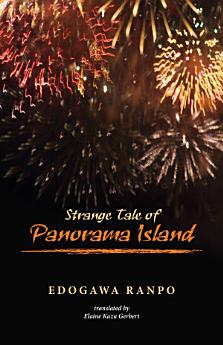Strange Tale of Panorama Island
jan 2013 · University of Hawaii Press
Libër elektronik
144
Faqe
family_home
I përshtatshëm
info
reportVlerësimet dhe komentet nuk janë të verifikuara Mëso më shumë
Rreth këtij libri elektronik
Edogawa Ranpo (1894-1965) was a great admirer of Edgar Allan Poe and like Poe drew on his penchant for the grotesque and the bizarre to explore the boundaries of conventional thought. Best known as the founder of the modern Japanese detective novel, Ranpo wrote for a youthful audience, and a taste for playacting and theatre animates his stories. His writing is often associated with the era of ero guro nansense (erotic grotesque nonsense), which accompanied the rise of mass culture and mass media in urban Japan in the 1920s. Characterized by an almost lurid fascination with simulacra and illusion, the era’s sensibility permeates Ranpo's first major work and one of his finest achievements, Strange Tale of Panorama Island (Panoramato kidan), published in 1926.
Ranpo’s panorama island is filled with cleverly designed optical illusions: a staircase rises into the sky; white feathered “birds” speak in women’s voices and offer to serve as vehicles; clusters of naked men and women romp on slopes carpeted with rainbow-colored flowers. His fantastical utopia is filled with entrancing music and strange sweet odors, and nothing is ordinary, predictable, or boring. The novella reflected the new culture of mechanically produced simulated realities (movies, photographs, advertisements, stereoscopic and panoramic images) and focused on themes of the doppelganger and appropriated identities: its main character steals the identity of an acquaintance. The novella’s utopian vision, argues translator Elaine Gerbert, mirrors the expansionist dreams that fed Japan's colonization of the Asian continent, its ending an eerie harbinger of the collapse of those dreams.
Today just as a new generation of technologies is transforming the way we think—and becoming ever more invasive and pervasive—Ranpo's work is attracting a new generation of readers. In the past few decades his writing has inspired films, anime, plays, and manga, and many translations of his stories, essays, and novels have appeared, but to date no English-language translation of Panoramato kidan has been available. This volume, which includes a critical introduction and notes, fills that gap and uncovers for English-language readers an important new dimension of an ever stimulating, provocative talent.
Ranpo’s panorama island is filled with cleverly designed optical illusions: a staircase rises into the sky; white feathered “birds” speak in women’s voices and offer to serve as vehicles; clusters of naked men and women romp on slopes carpeted with rainbow-colored flowers. His fantastical utopia is filled with entrancing music and strange sweet odors, and nothing is ordinary, predictable, or boring. The novella reflected the new culture of mechanically produced simulated realities (movies, photographs, advertisements, stereoscopic and panoramic images) and focused on themes of the doppelganger and appropriated identities: its main character steals the identity of an acquaintance. The novella’s utopian vision, argues translator Elaine Gerbert, mirrors the expansionist dreams that fed Japan's colonization of the Asian continent, its ending an eerie harbinger of the collapse of those dreams.
Today just as a new generation of technologies is transforming the way we think—and becoming ever more invasive and pervasive—Ranpo's work is attracting a new generation of readers. In the past few decades his writing has inspired films, anime, plays, and manga, and many translations of his stories, essays, and novels have appeared, but to date no English-language translation of Panoramato kidan has been available. This volume, which includes a critical introduction and notes, fills that gap and uncovers for English-language readers an important new dimension of an ever stimulating, provocative talent.
Vlerëso këtë libër elektronik
Na trego se çfarë mendon.
Informacione për leximin
Telefona inteligjentë dhe tabletë
Instalo aplikacionin "Librat e Google Play" për Android dhe iPad/iPhone. Ai sinkronizohet automatikisht me llogarinë tënde dhe të lejon të lexosh online dhe offline kudo që të ndodhesh.
Laptopë dhe kompjuterë
Mund të dëgjosh librat me audio të blerë në Google Play duke përdorur shfletuesin e uebit të kompjuterit.
Lexuesit elektronikë dhe pajisjet e tjera
Për të lexuar në pajisjet me bojë elektronike si p.sh. lexuesit e librave elektronikë Kobo, do të të duhet të shkarkosh një skedar dhe ta transferosh atë te pajisja jote. Ndiq udhëzimet e detajuara në Qendrën e ndihmës për të transferuar skedarët te lexuesit e mbështetur të librave elektronikë.








